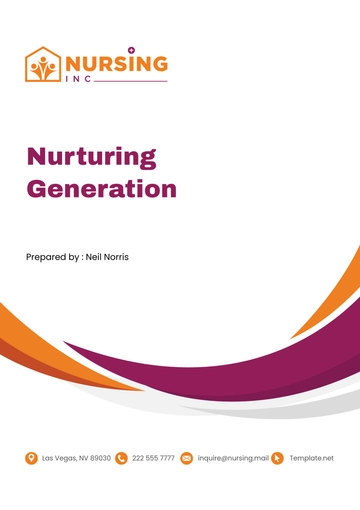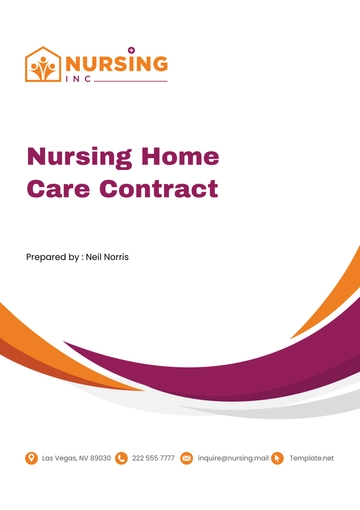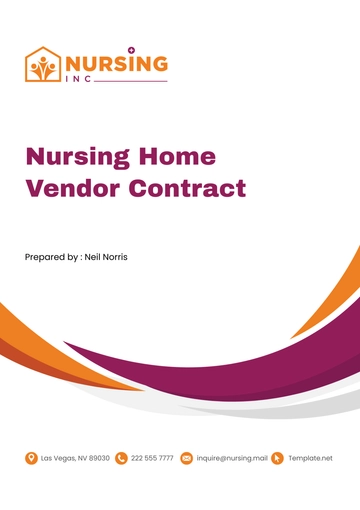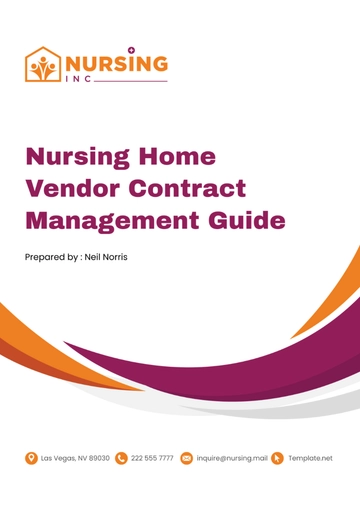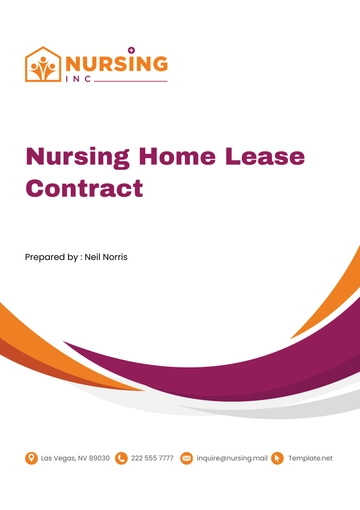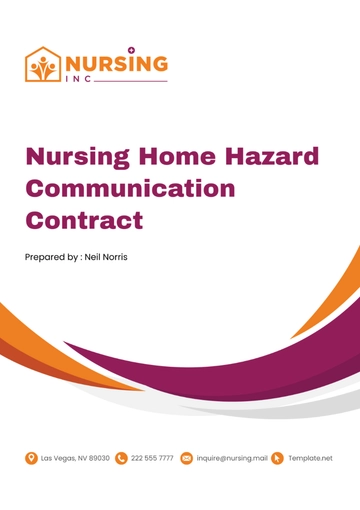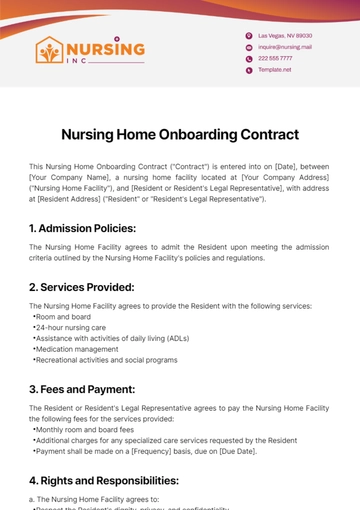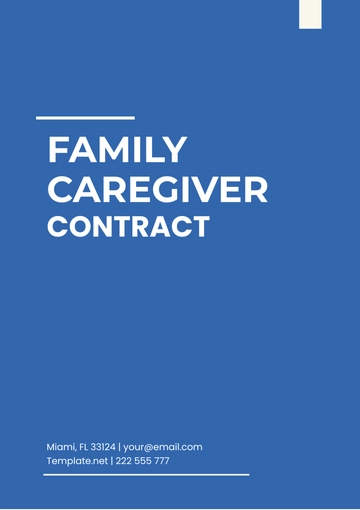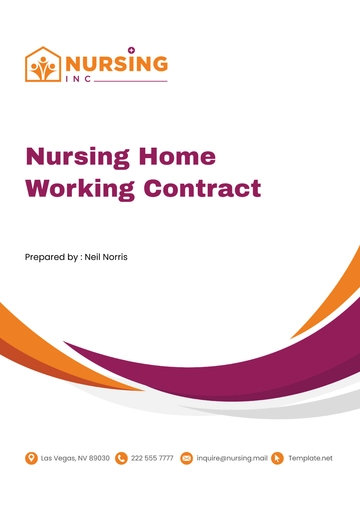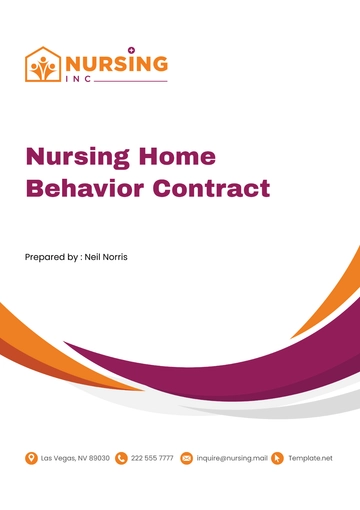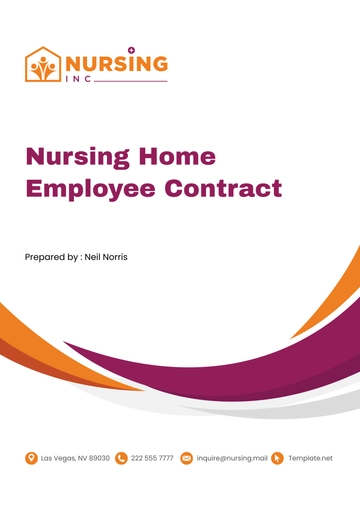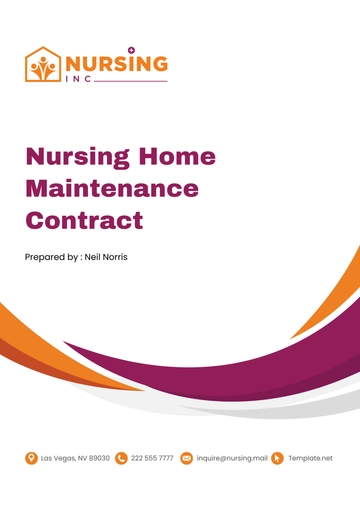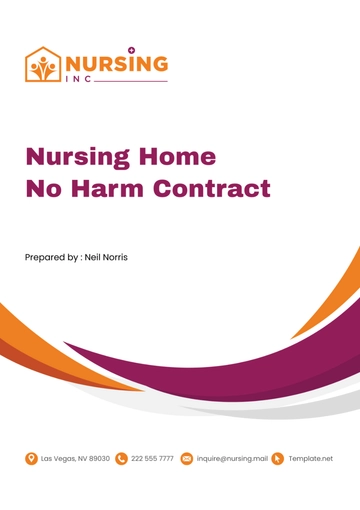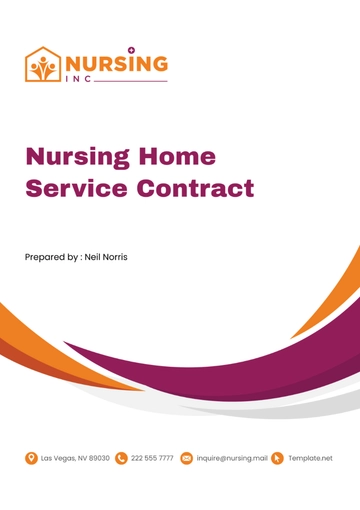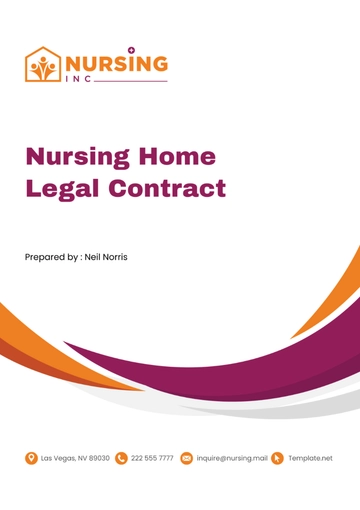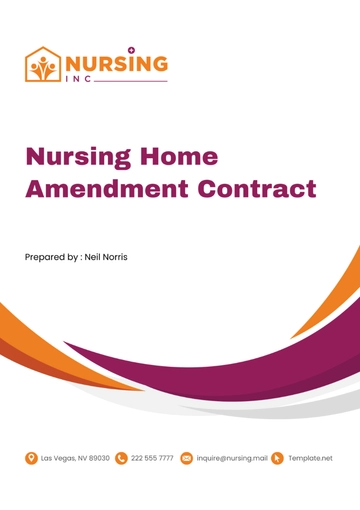Free Nursing Home Employee Contract
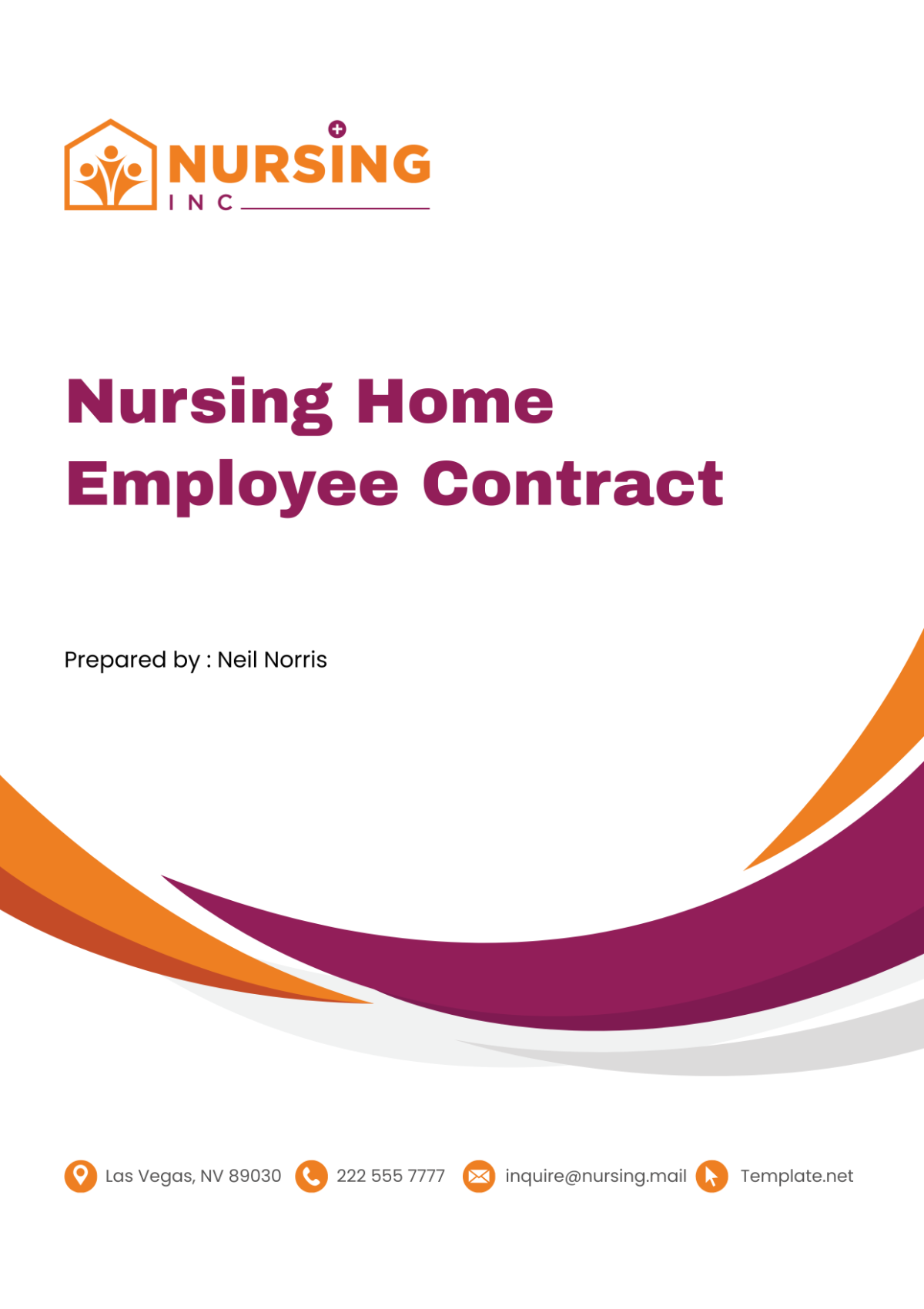
I. The Parties
This Nursing Home Employee Contract (the "Agreement") is entered and effective this [Month Day, Year] (the "Effective Date"), by and between [Your Company Name], with its principal place of business at [Your Company Address] (hereinafter "the Employer") and [Employee's Name] (hereinafter "the Employee") collectively called ("the Parties").
WHEREAS, the Employer is in the business of providing quality care and services to its residents and is in need of skilled and dedicated employees to fulfill its mission;
WHEREAS, the Employee has the necessary qualifications, experience, and skills to provide the services required by the Employer and has agreed to be employed by the Employer under the terms and conditions set forth in this Agreement;
WHEREAS, both Parties acknowledge and agree that this Agreement is in compliance with all applicable laws and regulations and that any breach of this Agreement may result in legal consequences;
NOW, THEREFORE, in consideration of the mutual covenants contained herein and for other good and valuable consideration, the receipt and sufficiency of which is hereby acknowledged, the Parties agree as follows:
II. Employment Terms
A. Employment Status
Full-Time Employment: The Employer shall employ the Employee as a full-time employee under the terms outlined in this Agreement. This means that the Employee is expected to work the standard number of hours in a workweek, typically [40] hours.
Non-Exempt Status: The Employee’s employment status shall be non-exempt. This classification means that the Employee is eligible for overtime pay in accordance with state and federal laws. Overtime pay is typically calculated as one and a half times the regular hourly rate for any hours worked beyond the standard workweek.
At-Will Employment: The Employee’s employment with the Employer is at-will. This means that either the Employer or the Employee can terminate the employment relationship at any time, with or without cause or notice. This provides both the Employer and the Employee with flexibility, but also means that job security is not guaranteed.
B. Work Schedule
Standard Work Schedule: The Employee’s regular work schedule shall be from Monday to Friday, [9:00 AM] to [5:00 PM]. This schedule ensures that the Employee is available during the Nursing Home’s peak operating hours, allowing for effective coordination with other staff members and efficient delivery of services to residents.
Flexibility: While this is the standard work schedule, the Employee may occasionally be required to work outside of these hours to meet the needs of the Nursing Home. This could include working on weekends, holidays, or during emergency situations. The Employer will provide as much notice as possible in these instances.
Breaks and Rest Periods: The Employee will be entitled to breaks and rest periods in accordance with state and federal labor laws. This includes a lunch break during each workday, as well as short rest periods throughout the day. These breaks are important for the Employee’s health and productivity.
Overtime: There may be times when the Employee is required to work beyond their regular hours to meet the needs of the Nursing Home. In such cases, the Employee will be compensated for overtime in accordance with state and federal labor laws.
Time Off: The Employee will be entitled to time off in accordance with the Nursing Home’s policies. This includes vacation time, sick leave, and personal days. The Employee is encouraged to use this time off to rest and recharge.
III. Job Description
A. Role and Responsibilities
Primary Role: The Employee’s primary role will be to provide high-quality care to the residents of the Nursing Home. This includes assisting residents with daily activities, monitoring their health and well-being, and responding to any emergencies.
Team Collaboration: The Employee will be expected to work closely with other staff members, including nurses, doctors, and administrative staff, to ensure that residents receive comprehensive care. This includes participating in team meetings, coordinating with other staff members, and contributing to the development of care plans for residents.
Compliance with Policies and Regulations: The Employee will be required to comply with all Nursing Home policies and procedures, as well as state and federal regulations governing nursing homes. This includes maintaining resident confidentiality, following infection control procedures, and participating in ongoing training and education.
Communication with Residents and Families: The Employee will be responsible for communicating effectively with residents and their families. This includes providing updates on a resident’s condition, addressing any concerns or complaints, and providing information about the Nursing Home’s services and policies.
Documentation: The Employee will be required to accurately document all care provided to residents, as well as any changes in a resident’s condition. This documentation is critical for ensuring continuity of care and for meeting regulatory requirements.
B. Performance Expectations
Quality of Care: The Employee is expected to provide high-quality care to all residents of the Nursing Home. This includes treating residents with dignity and respect, responding promptly to their needs, and striving to improve their quality of life.
Professionalism: The Employee is expected to maintain a high level of professionalism at all times. This includes dressing appropriately, treating others with respect, and adhering to the Nursing Home’s code of conduct.
Continuous Learning: The Employee is expected to engage in continuous learning to improve their skills and knowledge. This includes participating in training programs, attending workshops, and staying updated on best practices in nursing home care.
Teamwork: The Employee is expected to work effectively as part of a team. This includes communicating effectively with other staff members, collaborating on resident care plans, and supporting other team members as needed.
Compliance: The Employee is expected to comply with all state and federal regulations governing nursing homes. This includes maintaining resident confidentiality, following infection control procedures, and accurately documenting care provided to residents.
Performance Evaluation: The Employee’s performance will be evaluated on a regular basis to ensure they are meeting these expectations. The evaluation will consider the quality of care provided to residents, professionalism, continuous learning, teamwork, and compliance.
IV. Compensation
A. Base Salary
Monthly Salary: As compensation for the services provided, the Employee shall be paid at the rate of [$5000] per month. This salary is competitive and reflects the Employee’s skills, experience, and the responsibilities of the job. It is designed to provide a fair and stable income that allows the Employee to focus on providing high-quality care to the residents of the Nursing Home.
Payment Schedule: The Employee’s salary shall be payable on the [1st] of each month. This regular payment schedule helps ensure that the Employee receives their salary in a timely manner. It also allows for easier budgeting and financial planning for both the Employee and the Employer.
Annual Review: The Employee’s salary will be reviewed on an annual basis. During this review, the Employer will consider factors such as the Employee’s performance, changes in the cost of living, and market pay rates for similar roles. Any changes to the Employee’s salary will be communicated in writing and will take effect from the next pay period.
B. Overtime Pay
Eligibility: As a non-exempt employee, the Employee is eligible for overtime pay in accordance with state and federal labor laws. Overtime pay is typically calculated as one and a half times the regular hourly rate for any hours worked beyond the standard workweek. This ensures that the Employee is fairly compensated for any additional time and effort required to meet the needs of the Nursing Home.
Calculation: The Employee’s overtime pay will be calculated based on their regular hourly rate, which is determined by dividing the monthly salary by the number of regular work hours in a month. This calculation ensures that the Employee’s overtime pay is proportional to their regular pay and reflects the additional time they have worked.
Approval: All overtime work must be approved in advance by the Employer. This ensures that overtime is used strategically and effectively, and helps manage labor costs. The Employee should submit a request for overtime to their supervisor as far in advance as possible.
C. Benefits
Health Insurance: The Employee will be eligible for health insurance benefits, as provided by the Nursing Home. Details about the health insurance coverage, including eligibility, coverage, and premiums, will be provided separately. The Employer recognizes the importance of health insurance in providing financial protection against high medical costs and promoting overall health and well-being.
Retirement Plan: The Employee will be eligible to participate in the Nursing Home’s retirement plan. Details about the retirement plan, including eligibility, contributions, and vesting, will be provided separately. The Employer is committed to helping employees prepare for their future and believes that a robust retirement plan is a key component of a comprehensive benefits package.
Paid Time Off: The Employee will be entitled to paid time off, including vacation time, sick leave, and personal days, in accordance with the Nursing Home’s policies. The Employer recognizes the importance of work-life balance and believes that paid time off is essential for the Employee’s rest, relaxation, and personal well-being.
D. Taxes
Withholding: The Employer will withhold all applicable federal, state, and local taxes from the Employee’s salary, as required by law. This ensures that the Employee’s tax obligations are met in a timely and efficient manner, and reduces the Employee’s burden during tax season.
Reporting: The Employer will provide the Employee with a W-2 form each year, reporting the Employee’s earnings and the taxes withheld. This form is essential for the Employee’s tax filing and provides a clear and accurate record of the Employee’s income and tax payments.
Tax Advice: While the Employer is responsible for withholding taxes and providing tax forms, the Employee is encouraged to seek independent tax advice. This can help the Employee understand their tax obligations, take advantage of any applicable tax deductions or credits, and plan for their financial future.
V. Confidentiality
A. Confidential Information
Definition: Confidential information refers to all non-public information that might be of use to competitors or harmful to the Nursing Home or its residents if disclosed. It includes, but is not limited to:
1.1. Proprietary Information: This includes any information related to the Nursing Home’s unique practices, methodologies, and tools. This information gives the Nursing Home a competitive edge and is not known to the public or other competitors.
1.2. Business Strategies: This includes information about the Nursing Home’s strategic plans, marketing strategies, financial information, and other business-related data. Revealing this information could give competitors an unfair advantage and harm the Nursing Home’s business.
1.3. Patient Records: This includes all information about a patient’s medical condition, personal life, and relationship with the Nursing Home. This information is protected by privacy laws and must be handled with the utmost care.
1.4. Operational Methods: This includes information about how the Nursing Home operates on a day-to-day basis. This could include staffing schedules, care protocols, and other operational details.
1.5. Other Confidential Information: This includes any other information that the Nursing Home considers confidential and has taken steps to protect. This could include information about new services or programs, research and development activities, and more.
Protection: The Employee must protect such confidential information by safeguarding it when in use and storing it properly when not in use. Any unauthorized disclosure, whether intentional or accidental, could cause significant harm to the Nursing Home and its residents. This includes:
2.1. Secure Storage: Confidential information should be stored securely when not in use. This could include locking files in a secure cabinet or using password protection for digital files.
2.2. Limited Access: Access to confidential information should be limited to those who need it to perform their job duties. This can help prevent unauthorized access and accidental disclosure.
2.3. Proper Disposal: When confidential information is no longer needed, it should be disposed of properly. This could include shredding paper documents or permanently deleting digital files.
Access: The Employee should only access confidential information that is necessary for their work. Accessing, using, or disclosing confidential information without a legitimate work purpose is strictly prohibited. This includes:
3.1. Need-to-Know Basis: Employees should only access the confidential information that they need to know to perform their job duties. This helps minimize the risk of accidental disclosure.
3.2. Unauthorized Use: Employees should not use confidential information for their own benefit or the benefit of others. This could include using the information to gain a personal advantage or to help others gain an unfair advantage.
3.3. Unauthorized Disclosure: Employees should not disclose confidential information to anyone without authorization. This includes sharing the information with coworkers who do not need to know the information, as well as sharing the information with friends, family, or others outside of the Nursing Home.
B. Professional Matters
Scope: Professional matters concerning the Employer or any patient of the Employer that may come to the Employee’s knowledge must be kept in the strictest of confidence. This includes information about the Nursing Home’s operations, financials, strategic plans, and patient information.
Disclosure: The Employee must not disclose any such information to any person or entity, except as required in the course of their employment with the Nursing Home, or as required by law.
Post-Employment: This obligation to maintain confidentiality will continue even after the Employee’s employment with the Nursing Home ends. The Employee must return all documents and other materials containing confidential information when their employment ends.
C. Patient Information
Privacy: The Employee must respect and protect the privacy of all patients. This includes all information about a patient’s medical condition, personal life, and relationship with the Nursing Home.
Health Records: The Employee will have access to patient health records, which are confidential and protected by law. The Employee must handle such records in accordance with the Nursing Home’s policies and applicable laws.
Disclosure: The Employee must not disclose any patient information to anyone, except as necessary to provide care to the patient, or as required by law. This includes family members, friends, and the media.
VI. Non-Compete
A. Non-Compete Agreement
During Employment: The Employee agrees that during the term of this Agreement, they will not engage in any business or activity that is competitive with the Employer’s business. This includes, but is not limited to, working for a competing nursing home, starting a similar business, or consulting for a business in the same industry. This is to ensure that the Employee’s focus and commitment are fully dedicated to the Employer.
Post-Employment: The Employee also agrees that for a period of [3] years following the termination of this Agreement, they will not engage in any business or activity that is competitive with the Employer’s business. This is to protect the Employer’s business interests and prevent any potential conflicts of interest.
Geographical Scope: This non-compete agreement applies to any geographical location where the Employer operates or plans to operate. This is to prevent the Employee from competing with the Employer in the same market.
B. Exceptions and Limitations
Reasonableness: The duration, geographical scope, and restrictions of this non-compete agreement must be reasonable. If they are deemed unreasonable by a court, they may be modified or invalidated.
Consent: The Employee may engage in a competitive business or activity if they obtain the Employer’s written consent. The Employer may grant or withhold consent at its sole discretion.
Termination of Agreement: If the Employee’s employment is terminated by the Employer without cause, the non-compete agreement may not apply. This depends on the specific terms of the Agreement and applicable laws.
C. Remedies for Breach
Injunction: If the Employee breaches this non-compete agreement, the Employer may seek an injunction from a court. An injunction is a court order that requires the Employee to stop the competitive activity.
Damages: The Employer may also seek damages for any losses caused by the Employee’s breach of the non-compete agreement. This could include lost profits, loss of business opportunities, and reputational damage.
Attorney’s Fees: If the Employer has to take legal action to enforce the non-compete agreement, the Employee may be required to pay the Employer’s attorney’s fees and court costs.
VII. Termination
A. Termination by Either Party
Written Notice: Either Party may terminate this Agreement by providing written notice to the other Party. This ensures that there is a clear record of the termination and allows the other Party to prepare for the end of the Agreement.
Notice Period: The notice period for termination will be as specified in the Agreement. This period is designed to give both Parties sufficient time to transition their responsibilities and obligations under the Agreement.
Delivery of Notice: The notice of termination must be delivered in accordance with the notice provisions of the Agreement. This could include delivery by mail, email, or personal delivery.
B. Termination for Cause
Breach of Agreement: If either Party breaches any term of this Agreement, the other Party may terminate the Agreement immediately upon written notice. This ensures that both Parties are held accountable for their obligations under the Agreement.
Failure to Perform: If either Party fails to perform their duties under the Agreement, the other Party may terminate the Agreement. This includes failure to provide services, failure to pay for services, or failure to comply with any other obligations under the Agreement.
Illegal Activity: If either Party engages in illegal activity related to the Agreement, the other Party may terminate the Agreement immediately. This protects both Parties from legal liability and ensures the integrity of their operations.
C. Effects of Termination
Final Payment: Upon termination of the Agreement, the Employer will provide the Employee with their final payment, including any unpaid salary and accrued benefits. This ensures that the Employee is fairly compensated for their work up to the date of termination.
Return of Property: Upon termination of the Agreement, the Employee must return all property of the Employer, including keys, equipment, documents, and confidential information. This protects the Employer’s property and information.
Survival of Terms: Certain terms of the Agreement will survive its termination, including confidentiality, dispute resolution, and any other terms that by their nature should survive termination. This ensures that both Parties continue to respect their obligations even after the Agreement ends.
VIII. Governing Law
A. Applicable Law
State Law: This Agreement shall be governed in all respects by the laws of [State Name]. This means that the laws of [State Name] will be used to interpret the Agreement and resolve any disputes or issues that arise under the Agreement. This includes laws related to contracts, employment, and healthcare.
Federal Law: In addition to state law, certain aspects of the Agreement may also be governed by federal law. This includes laws related to healthcare privacy, labor standards, and discrimination. The Employee and the Employer must comply with all applicable federal laws.
Conflict of Laws: If there is a conflict between state law and federal law, or between the laws of different states, the conflict will be resolved in accordance with the principles of conflict of laws. This typically involves determining which law has the most significant relationship to the issue at hand.
B. Jurisdiction
Court Jurisdiction: Any legal action related to this Agreement must be brought in the courts of [State Name]. This ensures that any disputes are resolved in a location that is familiar with the governing law of the Agreement.
Consent to Jurisdiction: By entering into this Agreement, the Employee and the Employer consent to the jurisdiction of the courts of [State Name]. This means that they agree to bring any legal actions related to the Agreement in these courts and to abide by the decisions of these courts.
Venue: The venue for any legal action will be the county where the Nursing Home is located. This provides a convenient and appropriate location for resolving disputes.
C. Changes in Law
Effect on Agreement: If there are changes in the laws of [State Name] or in federal law that affect this Agreement, the Agreement will be interpreted in accordance with the new laws. This ensures that the Agreement remains legal and enforceable.
Notification: If the Employer becomes aware of any changes in law that significantly affect the Agreement, the Employer will notify the Employee as soon as possible. This ensures that the Employee is aware of the changes and can take any necessary actions.
Amendments: If necessary, the Agreement may be amended to comply with changes in law. Any amendments must be in writing and signed by both Parties.
IX. Signatures
IN WITNESS WHEREOF, the Parties have executed this Agreement as of the Effective Date.
Employer

[Authorized Representative Name]
[Your Company Name]
Date: [Month Day, Year]
Employee

[Employee's Name]
Date: [Month Day, Year]
- 100% Customizable, free editor
- Access 1 Million+ Templates, photo’s & graphics
- Download or share as a template
- Click and replace photos, graphics, text, backgrounds
- Resize, crop, AI write & more
- Access advanced editor
Establish clear employee expectations with this conveniently editable and customizable Nursing Home Employee Contract Template from Template.net, a comprehensive resource designed to outline the terms and conditions of employment for staff members! Utilize the AI Editor Tool to streamline the contract creation process and ensure accuracy in documenting employee expectations!
You may also like
- Rental Contract
- Contractor Contract
- Contract Agreement
- One Page Contract
- School Contract
- Social Media Contract
- Service Contract
- Business Contract
- Restaurant Contract
- Marketing Contract
- Real Estate Contract
- IT Contract
- Cleaning Contract
- Property Contract
- Supplier Contract
- Partnership Contract
- Food Business Contract
- Construction Contract
- Employment Contract
- Investment Contract
- Project Contract
- Payment Contract
- Student Contract
- Travel Agency Contract
- Startup Contract
- Annual Maintenance Contract
- Employee Contract
- Gym Contract
- Event Planning Contract
- Personal Contract
- Nursing Home Contract
- Law Firm Contract
- Work from Home Contract
- Software Development Contract
- Maintenance Contract
- Music Contract
- Amendment Contract
- Band Contract
- DJ Contract
- University Contract
- Salon Contract
- Renovation Contract
- Photography Contract
- Lawn Care Contract
